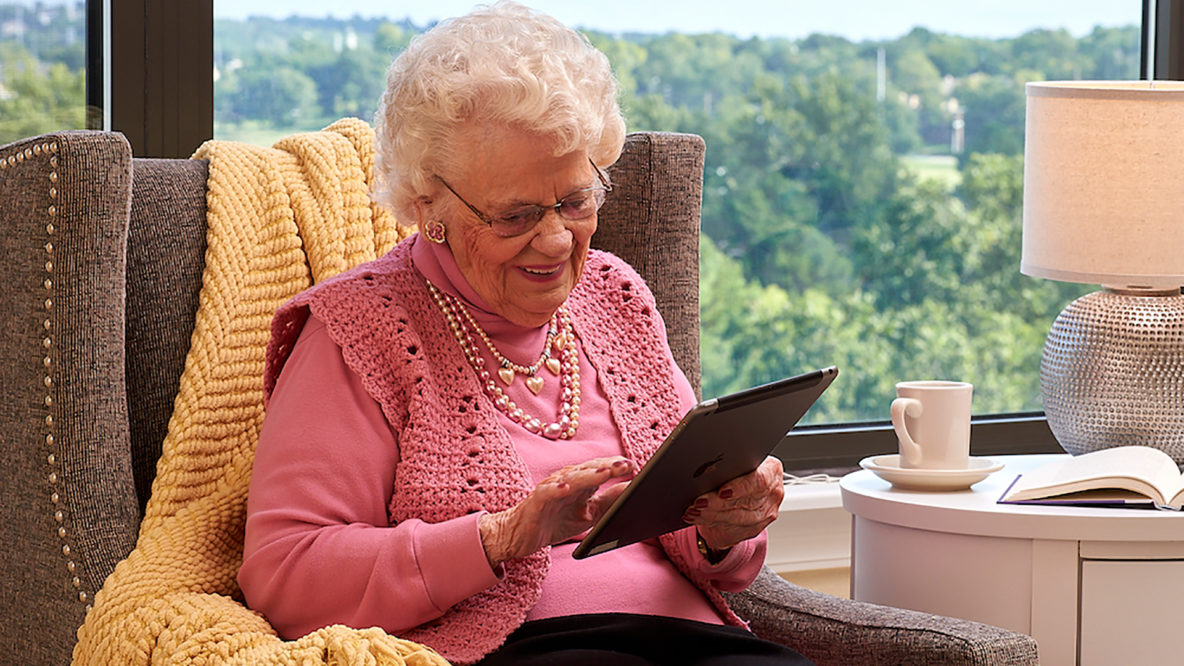Choices, even those made with compassion and love, can be difficult. Having the answers you need from the start can make it much easier to decide what to do. If you have a loved one living with Alzheimer’s disease or another form of dementia, you may be realizing it’s time to decide which is the best option for them and for you: memory care or home care?
At Senior Star, we’d like to help. Our proven experience in providing memory support has given us valuable insight and we are here for you.
Memory care or home care: which is the best option?
First, it’s important to understand the differences between memory care (also known as memory support) and home care.
- What is memory care?
Memory care refers to the care given to individuals with Alzheimer’s disease or another form of dementia in a senior living community. Specially trained caregivers assist residents with medications, bathing, dressing and other activities of daily living. Individuals live in secured units — often referred to as “neighborhoods” — designed for safety, comfort and convenience. Care and assistance is available 24/7. Specialized programming is tailored to the individual, such as music therapy, art therapy, reminiscence therapy, secure access to the outdoors, and more. Dining is provided in a soothing and familiar setting. Other services include housekeeping, transportation to medical appointments, and a range of therapeutic and engaging activities.
When considering a memory support community, here are a few questions to ask:
- What is the staff to resident ratio?
- What kind of training has the staff received?
- What is the resident makeup in memory care? (age, gender, impairment)
- What are the rooms like?
- How is dining structured?
- How is the building secured?
- How are medical emergencies handled?
- What are the activities and how often do they take place?
- How does the community stay in touch with families?
Senior Star memory support communities provide a setting that is as safe as it is comfortable. Our team of trained professionals gets to know your loved one to understand who they are and what kind of person-centered support they need. Family members have the peace of mind that their loved ones are receiving a level of care and attention that most likely is not available at home.
- What is home care?
The goal of home care is for individuals to remain at home as long as possible. There, an individual may receive assistance with daily activities from home care aides, depending upon the level of care needed. For example, it might just be a few hours a week for meal preparation, housekeeping, transportation, laundry, etc.; or, it might be 24-hour supervision for those seniors whose needs are greater.
Home care can be adjusted as the person ages. However, for successful home care of an individual with early-to-mid-stage cognitive decline, significant adjustments are needed to limit safety risks. For example, accommodations may include door and window alarms, grab bars and stair lifts, clear walkways, a secured outdoor area, and so on.
As a person progresses through the stages of memory loss, it becomes increasingly difficult for family caregivers to maintain the level of care needed. The cost of 24/7 home care also can be prohibitive.
Memory care vs. home care: signs it is no longer possible to stay at home:
- You can no longer keep your loved one safe at home. There may be unexplained weight loss, bruises from falls or wandering, difficulty standing or walking, or pain from sitting too long.
- They have progressed to the next stage. They are needing assistance with all activities, are unable to take medications correctly, there are signs of agitation and aggression, or there is further withdrawal from those around them.
- Caregiver stress becomes overwhelming. Signs include exhaustion, irritation, inability to sleep, lashing out at others, or not communicating. Bills may go unpaid, dishes stack up, duties and obligations are ignored and not done.
- Isolation is the norm. They retreat inward and shut down, with no interaction at all.
- When you just know something is wrong. Instincts will often tell you that things are not right and must change for everyone’s benefit. There is no guilt in realizing another solution may be the best one at this point.
Feeling good about the move
Memory care vs. home care is a decision many families face. Choosing a quality memory support setting such as that provided by Senior Star is choosing a healthy, nurturing lifestyle. Our memory support neighborhoods provide the familiar routine and personalized activities that help residents regain a sense of purpose. In this calmer setting, with caregivers specially trained in cueing and prompting, the world becomes more manageable. Also, being around others can slow cognitive decline. Surrounded by their peers, individuals with dementia often feel more comfortable and relaxed.
And, with your loved one safely settled in a warm, caring and safe setting, you can return to being a daughter, son, or spouse again.
Your loved one is known and valued in memory support at Senior Star. Our Memory support program nurtures the individuality, knowledge and skills that remain to help your loved one experience meaning and joy in each day. Schedule a virtual or in-person tour. Questions about Senior Star and our senior living communities? Contact us. And download our free guide “Just The Facts, Your Guide to Memory Care” for answers to questions about this living option.


